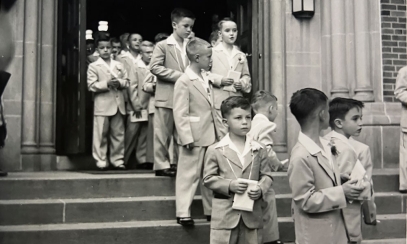
Dear students: Let’s think beyond popularity
Children have major challenges in school, Catholic schools included: gun violence, drugs and alcohol, sexual and gender pressures, social media and bullying, assaults on the very churches that sponsor their schools. One lower-profile concern might be more widespread than all the others combined: children who lack confidence, feel left out, alone and ignored. In common terms, they are not members of the “popular” crowd.
Children have major challenges in school, Catholic schools included: gun violence, drugs and alcohol, sexual and gender pressures, social media and bullying, assaults on the very churches that sponsor their schools. One lower-profile concern might be more widespread than all the others combined: children who lack confidence, feel left out, alone and ignored. In common terms, they are not members of the “popular” crowd.
Most students are just good kids lost in the tween and teen years. They are likely normal in appearance and abilities, but lack confidence or social skills when it comes to navigating the complexities of teenage relationship dynamics.
I might even go so far as to imagine the young Mary and maybe Jesus as being two teenagers that didn’t fit in — both were definitely different from the crowd, right from their immaculate beginnings.
If we knew then what we know now
Historically, teenagers have worried about what “popular” kids think, and have done their best to join this group. It’s much more insidious these days because that popular group extends online to influencers and celebrities like never before. An entire world of unmanageable expectations and often gratuitous wealth is open to our teens in a way no other generation has encountered.
After much effort to fit into these molds or achieve The Look, they will often find themselves disappointed by rejection or inability to be like the caricatures seen online, thereby becoming even more frustrated or depressed.
While we adults might not have the current-day lingo, social media savvy, or be totally “in touch” with what’s popular, wouldn’t we nonetheless like to tell today’s youth what we now see so clearly in the rearview mirror of age and experience? Let me give it a try:
1. Popularity
All those kids who seem so popular now likely won’t be so forever. Some will succeed in life, but many of them will be among those who struggle. Actually, the ones who will succeed are probably not the ones who are shunning others now. People who are too busy running around being popular to attend to the really important matters that will ultimately get them ahead in life — well, aren’t going to get ahead in life. And as for the less popular kids, it is worth noting that Jesus wasn’t popular in many circles either.
2. Credentials.
I venture to say that if one does not meet the standards of the “in” group, that person cannot acquire the necessary credentials to be a “popular” kid. So, don’t waste time on it or them. It won’t really be your authentic, Christ-beloved self. Who wants to be fake?
3. Strengths.
The thing that will bring you the most recognition is to concentrate on what you are good at and try to be superior in those particular areas. You might be good at science, art, cooking, writing, sports, music or some little known skill or activity. Become the best you can at that, display your skill in competitions, become known for this particular talent.
Others will notice you for your uniqueness, and seek you out for your particular expertise. Plus you will be building on something for the future that may pay dividends you can’t currently foresee: think about St. John Bosco. Young Giovanni Bosco attracted friends with his juggling acts, which were combined with prayer and discussions of the faith. He did not realize that he was preparing himself for his future life’s work.
4. Outreach.
Look for other students like you, or anyone who looks alone, lost or doesn’t seem to fit in. Reach out to them, invite them to sit with you at lunch, ask them about themselves, make them feel like someone else is interested. You don’t have to become best friends, but acknowledging another soul in need around you might make a difference — for both of you. It will make you forget yourself for a moment and become more natural. Do this for a lot of different people and others will come to know you for the kindness of your heart, for the way you think of and help others. Like Jesus, you might even convert someone to your happy way of practicing the faith.
5. Future.
Look toward your future and remember that school days are, in the end of it all, just a blip on the screen of life. You have so many life opportunities and experiences ahead of you. Most of it will not involve any of the people who seem so popular and important right now.
When you go off to college, most of your elementary and high school friends and foes will be left behind forever. It’s a sad but also comforting fact that once you have achieved success in whatever way God wills, you most likely will look back at the people who once made you uncomfortable and feel sorry for them. This is not to wish ill on anyone, but only to remind you that few, precious few, people in your academic life right now will remain in your life going forward.
Remember that Jesus said “the last will be first, and the first will be last” (Mt 20:16). Try to cultivate being content with where you are in life right this minute. You’ll be leagues ahead of most adults I know.
Finding be-attitudes
If you are struggling with the social side of school, build your own particular strengths and skills and reach out to other strugglers. Be yourself and look for ways to help others be who they are called by God to be. Look particularly beyond high school, to where the real world begins, and you can go as far as your efforts and perseverance will take you.
Even more importantly, remember these two combined beatitudes: Blessed are the meek and the poor in spirit, for they shall inherit the earth and the kingdom of heaven!
Thomas Dorsel, Ph.D., is professor emeritus of psychology and a graduate of the University of Notre Dame. He lives on Hilton Head Island with his wife Sue and is a parishioner at St. Francis by the Sea Church. Visit him at dorsel.com.



